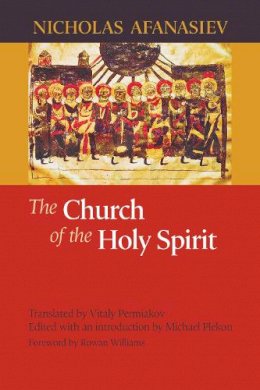Michael Plekon is professor of sociology at Baruch College. He is the author of Living Icons: People of Faith in the Eastern Church (University of Notre Dame Press, 2002).
“This is the first time that the classic work of Fr. Afanasiev, originally completed in 1950, has been published in English. Fr. Afanasiev joins a line of Orthodox theologians who attempt to understand the Church—that ‘subject which is not a subject,’ according to Fr. Schmemann—beyond the standard, canonical, approach. His voice, in this edition’s English, sounds timely even now.” —The Journal of Ecclesiastical History “Published posthumously in Russian in 1971 and in French in 1975, The Church of the Holy Spirit—together with other pieces in West European languages—established its author among the most significant Orthodox theologians of the mid-twentieth century. . . . In the present book and some other writings, Afanasiev was directly addressing problems that he saw in the current life of the Orthodox church(es). His criticisms are amply surrounded by a positive ecclesiological vision as he draws hints towards reform from apostolic and early patristic sources.” —Modern Theology “. . . This welcome volume is the first time that Afanasiev’s seminal work has been made fully accessible to the English-language reader. Afanasiev was one of the major theological thinkers of the twentieth century. His training as a church historian, his strong belief in the centrality of the work of the Holy Spirit in the Church, and his thorough grounding in patristics enabled him to be among the first theologians to initiate a profound renewal of Eucharistic ecclesiology, not only among Orthodox Christians, but within Catholic and Protestant traditions as well.” —Slavic and East European Journal “[The Church of the Holy Spirit] is a seminal work on the church and the liturgy which offers a rediscovery of the eucharistic and communal nature of the church in the first several centuries.” —Theology Digest "This felicitously translated posthumous work, The Church of the Holy Spirit (1971), is Afanasiev's magnum opus and it sets out to express his vision of the Church as the realization of the Eucharist by giving an historical account of earliest Christianity's 'eucharistic assembly' with all its constitutive ministries. The present translation makes a poorly known work easily accessible and it is therefore a gift of the authors both to contemporary scholarship, with its reassessment of Russian émigré culture and religious thought in a broad ecumenical perspective, and to the various churches indebted to Afanasiev's immense theological legacy.” —The Russian Review “[Afanasiev] was one of the most creative, original, and provocative Orthodox writers in recent generations. Permiakov's very readable English translation will bring a much larger audience to Afanasiev's insights and lead to critical engagement with his arguments.” —Theological Studies “. . . [this] is an important part of the history of twentieth-century ecclesiology. Afanasiev's eucharistic ecclesiology challenged the scholastic theology and eucharistic practices of his own Eastern Orthodox Church, contributed to the theology of the Second Vatican Council, and influenced other theologians, including John Meyendorff and Alexander Schmemann, who studied with Afanasiev at St. Sergius in Paris.” —Worship “The Church of the Holy Spirit is an outstanding Orthodox contribution to the understanding of the Church. . . . [It] offers Christians of different traditions a valuable look at the one Church as it was in the first centuries and as it may come to be again in the future.” —The Living Church “In a work that is scholarly yet accessible to the educated layperson, the late Afanasiev (1893–1966, St. Sergius Orthodox Seminary, Paris), Russian-born Orthodox priest and theologian, considers the evolution of the office of bishop in the Christian church. . . . Although completed more than 40 years ago, Afanasiev's book has a contemporary feel. Highly recommended for theology collections.” —Library Journal "Nicholas Afanasiev is perhaps the most important ecclesiologist of modern times in the Orthodox world. The Church of the Holy Spirit is a very important book, a magnum opus, demonstrating that Afanasiev himself is undoubtedly a major twentieth-century theologian.” —John McGuckin, Nielsen Professor of Early Ecclesiastical History, Union Theological Seminary

